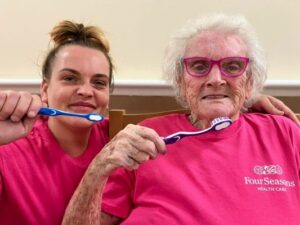The risk of sepsis in older age

Throughout September, Four Seasons Health Care Group are recognising Sepsis Awareness Month; building on our knowledge and supporting our residents, families and visitors to be better informed about the risks. By raising awareness and actively promoting prevention, we can help protect the well-being of our older loved ones and ensure they enjoy a healthy and fulfilling life.
As we age, our bodies undergo numerous changes, making us more vulnerable to various health challenges. One such threat is sepsis, a severe medical condition that occurs when the body’s response to an infection triggers a chain reaction, leading to widespread inflammation throughout the body. This condition can be life threatening, especially for older people due to weakened immune systems and age-related health issues. It is crucial that the teams in our homes are well informed about the risks of sepsis, how to spot the signs and how to prevent it to help protect our residents and ensure a high standard of care in our homes.
Common Symptoms
One of the most concerning aspects of sepsis, especially in older age, is its silent nature. Symptoms can be subtle and easily mistaken for other common ailments, such as the flu or urinary tract infections. Older adults may not exhibit the classic signs of sepsis, such as high fever and elevated heart rate, making early detection challenging. Here are some signs:
-
- Altered Mental State: Confusion, disorientation, or extreme lethargy can be early indicators of sepsis in older individuals.
- Rapid Breathing or Shortness of Breath: Difficulty in breathing or rapid, shallow breaths may suggest sepsis-related respiratory distress.
- Low Blood Pressure: A drop in blood pressure is a critical sign of sepsis, leading to decreased blood flow to vital organs.
- Fever or Hypothermia: Older people may not always develop a high fever, but a lower-than-normal body temperature can also be a warning sign.
- Decreased Urine Output: A sudden decrease in urine output may signal kidney dysfunction, a common complication of sepsis.
Helping to prevent sepsis
While sepsis can be life threatening, there are steps older people and those that care for them can take to reduce the risk:
- Ensure recommended vaccinations are taken, such as the flu and pneumonia vaccines, which can help prevent infections that may lead to sepsis.
- Pay close attention to wound care, including any post-operative wounds, bedsores, or injuries and treat any signs of infection.
- Practicing good hygiene, including regular handwashing, can help prevent infections that may trigger sepsis.
- Seek prompt medical attention for any infections, no matter how minor they may seem. Early treatment can prevent the progression to sepsis.
- Ensure that older adults are taking their prescribed medications correctly and discuss any side effects or concerns with healthcare providers.
- Take care of gums and teeth by following a good oral health care routine as one of the most common ways someone can develop sepsis is through oral infection.
Oral Healthcare in Older People
As we age, our oral health can deteriorate due to a variety of factors, such as reduced saliva production, chronic medical conditions, and medication side effects. However, by following proper oral care we can significantly improve our overall health and quality of life.
Here are some key considerations for maintaining oral health in older individuals:
- Routine dental visits are essential for identifying and addressing oral health issues early. Older adults should see their dentist at least twice a year for examinations and cleanings.
- Many medications can cause a dry mouth, which increases the risk of oral health problems. Regularly reviewing medications and care plans helps to identify and manage any issues.
- Older people who still have their own teeth should continue to brush well at least twice a day and floss daily to remove food particles and plaque. Using a soft-bristle toothbrush can be gentler on ageing gums.
- And lastly, a balanced diet rich in vitamins and minerals, especially calcium and vitamin D, supports healthy teeth and gums.
Signs of Infection
- Pain and Swelling: Persistent pain or swelling in the mouth or gums could indicate an infection.
- Bleeding Gums: Gums that bleed easily, especially when brushing or flossing, may be a sign of gum disease or infection.
- Bad Breath: Chronic bad breath (halitosis) can be a sign of an underlying oral health issue.
- Ulcers or Sores: Sores, white patches, or ulcers that do not heal within two weeks should be examined by a dentist.
 Preventing Gum Issues Related to Dentures
Preventing Gum Issues Related to Dentures
- Ensure that dentures fit well and do not cause friction or pressure on the gums. Regular adjustments may be necessary.
- Rinse the mouth with an antiseptic mouthwash to reduce the risk of infection.
- Visit the dentist regularly to monitor the fit of the dentures and address any issues promptly.
- Remove dentures after eating and rinse them thoroughly to remove food particles.
- Gently brush dentures with a soft-bristle brush and denture cleaner or mild soap. Avoid using toothpaste, as it can be abrasive.
- Soak dentures overnight in a denture-cleaning solution to help remove stains and bacteria.
- Be careful when handling dentures to prevent damage. Place a towel in the sink to avoid breakage if dropped.
Dentures and Living with Dementia
- Caring for someone with dementia can present unique challenges when it comes to oral hygiene and denture maintenance. Here are some key ways to encourage denture use:
- Create a daily routine for oral care and denture use. Consistency can help individuals with dementia feel more comfortable.
- Use clear, step-by-step instructions and demonstrations to guide them in placing and removing dentures.
- Offer praise and positive reinforcement when they wear their dentures correctly.
- Keep an eye on the condition of their dentures and offer assistance with cleaning and maintenance as needed.
TEAth Parties for World Sepsis Day September 13th
To help build awareness around good oral hygiene, all our care homes will be holding a TEAth Party for World Sepsis Day on 13th September for residents, families and visitors. Attendees will all be enjoying cake and drinks before being gifted toothbrushes for a teeth cleaning activity and discussion around the importance of good oral care.
 Advice Hub
Advice Hub Find a home
Find a home Enquire now
Enquire now